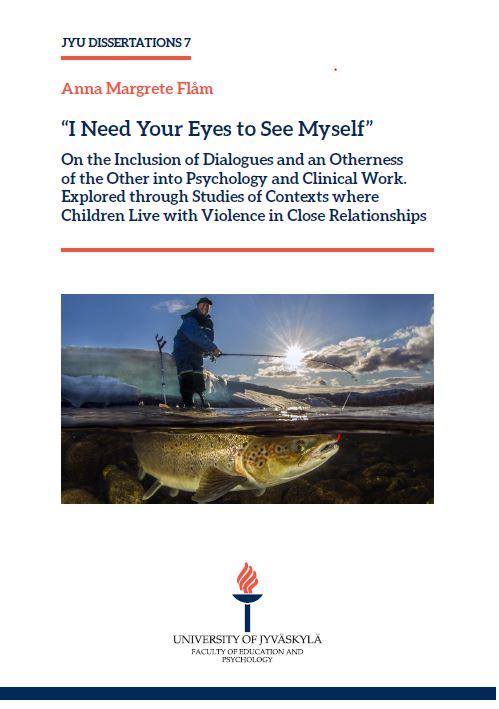Anna Margrete Flåm
DISSERTATION TITLE:
“I need your eyes to see myself” : on the inclusion of dialogues and an otherness of the other into psychology and clinical work : explored through studies of contexts where children live with violence in close relationships
Anna Margrete Flåm, Institute of Psychology, University of Tromsø – The Arctic University of Norway
Jyväskylä: University of Jyväskylä, 2018, 126 p.
JYU Dissertations
ISSN 2489-9003; 7
ISBN 978-951-39-7523-4 (PDF)
Abstract:
Violence in close relationships with children raises intriguing questions for our society. The sense making may go on in a fragile balance between possible false accusations and possible neglect of needed concerns. This study explores contexts where such concerns are at stake. From the vantage point of outlining main contributors towards a dialogical understanding of human meaning making, the study explores how this evolves when issues of child sexual abuse, violence, and maltreatment are at stake. The study examines three naturalistic settings: (1) A Norwegian university hospital’s specialty mental health service for children and adolescents, including all cases (N = 20) referred in two years for treatment after sexual abuse. Data were recollected in hindsight as part of therapy of how non-abusing caregivers became aware of children’s first signs. (2) A larger Norwegian public family protection service mandated to prioritize families with children and violence and its work in all such cases in one year (N = 106). Data comprised answers to semi-structured questionnaires and participatory research among all professionals. (3) A regional multi-agency, cross-professional consultation team for cases with children and violence. Data comprised analyses of the consultation process across cases over time. Together the studies illuminate a fine-tuned dialogical meaning making process in operation during all settings. Meaning making emerges as dialogically embedded and embodied. What particularly stands out as constitutive for the meaning making processes are contingencies constituted by tensions of space and time, of having a different voice, of trust, risk, and vulnerability, and of ethics intertwined inside each encounter. The knowledge connects to the contributions from the dialogical scholars. Comprehensively, a dialogical understanding makes it possible to realize how intricate it may be to differentiate when child sexual abuse, violence, and maltreatment occur and it calls for an open stance and responsive attunement for needed meaning making and alternatives to emerge.

